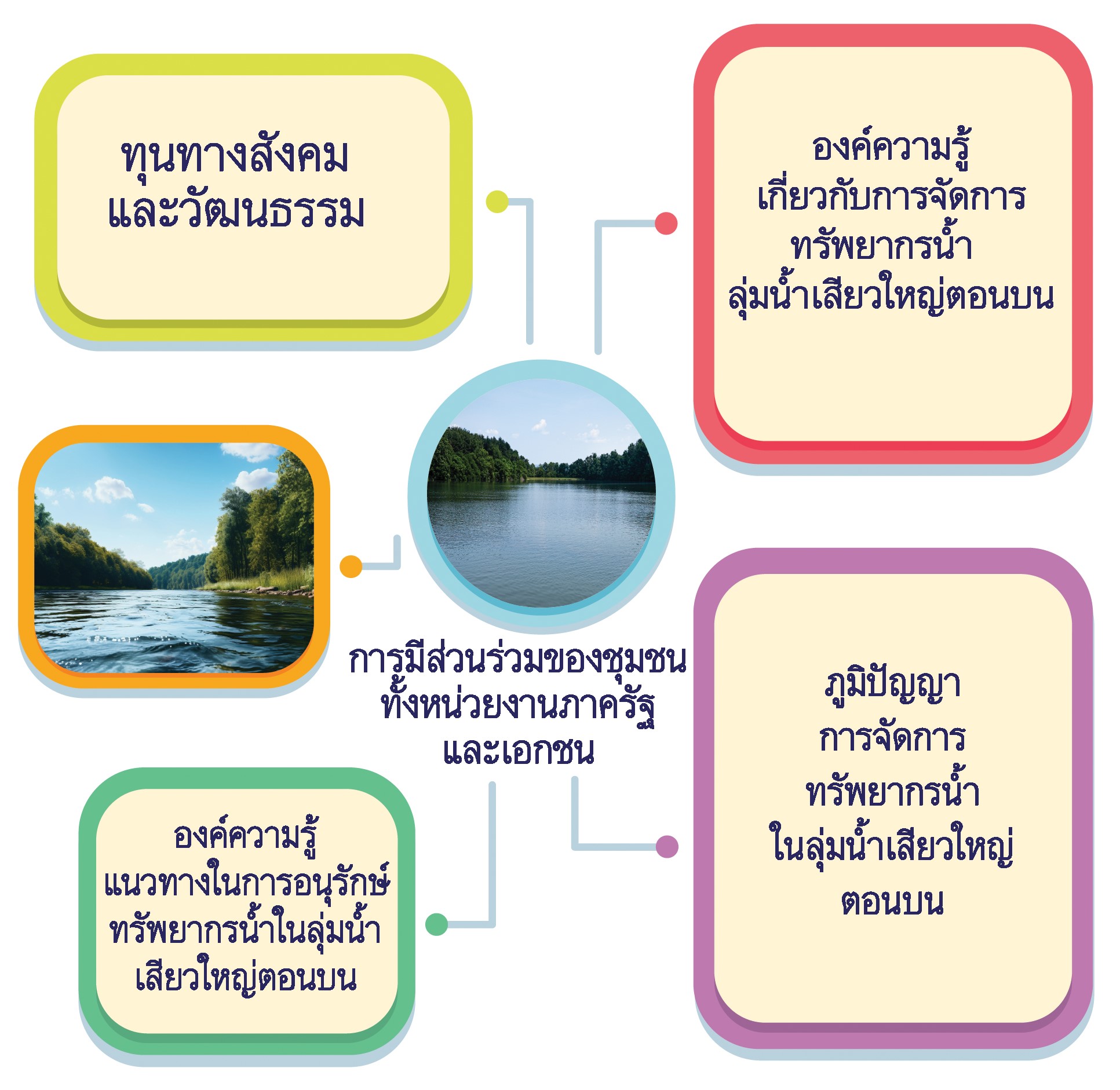Wisdom Water Resource Management in the upper Siew Yai River Basin
Main Article Content
Abstract
The purposes of this research were to study wisdom water resource management in the upper Siew Yai River Basin. It is qualitative research. There are methods for conducting research by studying information from documents and field data, interviews, and group discussions in-depth interview a sample group of 62 persons including participant observation in the upper Siew Yai River Basin community using Descriptive Analysis.
The results of the research found that: The Management of water resources in the upper Siew Yai River Basin by the communities of the upper Siew Yai river basin uses a set of beliefs to manage water resources through a belief capital that is rooted in the belief of ghosts associated with water, where the Grandfather Ghost (Phee Phu Ta). Where the traditional community has built shrines along the river basin from the upstream, midstream and downstream along the upper Siew Yai river basin. It is believed that the ghost of Pu Ta will take conservation of the community and the natural resources within the community. The set of beliefs that is still operating in the consciousness of local people who use water for consumption. Later, it was mixed with the local Buddhist beliefs, resulting in a merit-making ritual that invited the monks to pray for the Buddhist mantra at the dam, called Boon Phai, Including the results received from conversation group the community set of beliefs Ghosts, Brahmins, Buddhists mix interweaving. The Community used the management of water resources in the upper Siew Yai river basin to revive and reproduce at villager the belief in the Ghost of water and ghost town to be compensation ghost these at protects treat and conservation of Siew Yai River Basin resources.
Article Details

This work is licensed under a Creative Commons Attribution-NonCommercial-NoDerivatives 4.0 International License.
เพื่อให้เป็นไปตามกฎหมายลิขสิทธิ์ ผู้นิพนธ์ทุกท่านต้องลงลายมือชื่อในแบบฟอร์มใบมอบลิขสิทธิ์บทความ ให้แก่วารสารฯ พร้อมกับบทความต้นฉบับที่ได้แก้ไขครั้งสุดท้าย นอกจากนี้ ผู้นิพนธ์ทุกท่านต้องยืนยันว่าบทความ ต้นฉบับที่ส่งมาตีพิมพ์นั้น ได้ส่งมาตีพิมพ์เฉพาะในวารสาร วิชาการธรรม ทรรศน์ เพียงแห่งเดียวเท่านั้น หากมีการใช้ ภาพหรือตารางของผู้นิพนธ์อื่นที่ปรากฏในสิ่งตีพิมพ์อื่นมาแล้ว ผู้นิพนธ์ต้องขออนุญาตเจ้าของลิขสิทธิ์ก่อน พร้อมทั้ง แสดงหนังสือที่ได้รับการยินยอมต่อบรรณาธิการ ก่อนที่บทความจะได้รับการตีพิมพ์References
กรมทรัพยากรน้ำ. (2556). การบริหารจัดการน้ำของประเทศไทย. กรุงเทพฯ: กรมทรัพยากรน้ำ กระทรวงทรัพยากรธรรมชาติและสิ่งแวดล้อม.
ไกรสร เพ็งสกุล. (2551). การมีส่วนร่วมของประชาชนในการบริหารจัดการทรัพยากรน้ำศึกษา กรณี ลุ่มน้ำสาขาคลองปะเหลียน จังหวัดตรัง. (รายงานการวิจัย). สำนักงานทรัพยากรน้ำ กระทรวงทรัพยากรธรรมชาติและสิ่งแวดล้อม.
ณริศรา สุกแป้น. (2557). คลองจำไหร: พลวัตการจัดการทรัพยากรโดยชุมชน. (วิทยานิพนธ์ศิลปศาสตรมหาบัณฑิต). สงขลา: มหาวิทยาลัยสงขลานครินทร์.
ธนัน อนุมานราชธน. (2545). แนวทางการจัดการความขัดแย้งเกี่ยวกับทรัพยากรน้ำในเขตอำนาจขององค์การบริหารส่วนตำบลจังหวัดเชียงใหม่. เชียงใหม่: มหาวิทยาลัยเชียงใหม่.
ธีระภัทรา เอกผาชัยสวัสดิ์. (2553). การศึกษาและพัฒนารูปแบบการเสริมสร้างองค์กรชุมชนเข้มแข็ง กรณีศึกษา ตำบลวังชมพู อำเภอเมือง จังหวัดเพชรบูรณ์. (รายงานการวิจัย). เพชรบูรณ์: มหาวิทยาลัยราชภัฎเพชรบูรณ์.
บุผาชาติ จันทร์หอม. (2564). แนวทางการพัฒนาการมีส่วนร่วมของประชาชนในการจัดการน้ำสู่ความยั่งยืน. Journal of Roi Kaensarn Academi, 6(6), 340-356.
ประสิทธิ์ ประคองศรี. (2551). ภูมิปัญญาการจัดการระบบนิเวศและทรัพยากรน้ำเพื่อเศรษฐกิจพอเพียงระดับครัวเรือนอย่างยั่งยืน. ขอนแก่น: มหาวิทยาลัยขอนแก่น.
ราชันย์ หลงมีวงษ์. (2545). ผลกระทบต่อระบบนิเวศลุ่มน้ำเสียวใหญ่ตอนบน. มหาสารคาม: สำนักชลประทานที่ 6 กรมชลประทานจังหวัดมหาสารคาม.
วสันต์ จอมภักดี. (2550). การบริหารจัดการลุ่มน้ำในระดับท้องถิ่น. เชียงใหม่: คณะวิศวกรรมศาสตร์ มหาวิทยาลัยเชียงใหม่.
สุริยะ หาญพิชัย. (2560). ภูมิปัญญาท้องถิ่นในการจัดการทรัพยากรน้ำของชุมชนบ้านหนองเขื่อง อำเภอเมือง จังหวัดชัยภูมิ. วารสารวิชาการ มหาวิทยาลัยราชภัฏบุรีรัมย์, 9(1), 241-254.
สุวิชชา ศรีถาน และปรีดา ไชยา. (2559). การค้นหามรดกภูมิปัญญาอย่างมีส่วนร่วมของชุมชนแม่แจ่ม จังหวัดเชียงใหม่ เพื่อส่งเสริมการท่องเที่ยวอย่างยั่งยืน. วารสารวิทยาลัยดุสิตธานี, 10(1), 12-22.
อนุมาศ ทุริสุทธิ์. (2540). การพัฒนาศักยภาพกลุ่มผู้ใช้น้ำในการจัดการทรัพยากรน้ำของชุมชน. (รายงานการวิจัย). ขอนแก่น: มหาวิทยาลัยขอนแก่น.
อู่แก้ว ประกอบไวยกิจ บีเวอร์. (2543). มนุษย์ ระบบนิเวศ และสภาพนิเวศในประเทศไทย. (พิมพ์ครั้งที่ 4). กรุงเทพฯ: ไทยวัฒนาพานิช.
Steward, J. H. (1972). Theory of Culture Change: The Methodology of Multilinear Evolution. Urbana and Chicago: University of Illinois Press.

